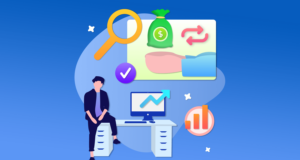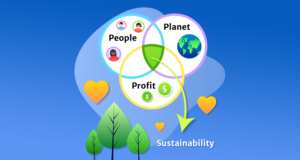4 Reasons Why Your Business Needs a Data-Driven Strategy
Blog Categories:
Published:
January 16, 2023
Reading Time:
7 minutes

Are you about to make a big business decision? Then wait, and ask yourself: Am I making this decision out of intuition or data?
You see, life is a series of decisions, big and small. Maybe you made a decision to wear a white shirt today. Maybe you decided to skip the gym and go for a run instead. Maybe you took the decision to cook food at home instead of ordering it online. These are the decisions that don’t require much thought. And these aren’t wrong or right decisions, they’re just decisions.
However, when it comes to business, flying blind is not a clever approach at all. Guesswork can cost you much more than you can imagine in business. That’s why you should always take data-driven decisions for your business.
Want to know if a product will bring profit or not? Collect data first. Want to learn how to attract top talent? Collect data first. Want to expand your business internationally? Collect data first. Want to beat competitors? Collect data first.
In this article, we’ll list 4 reasons why a data-driven business strategy is far superior to your gut feelings. At the end of the article, you’ll also learn how professionals can help you collect and analyze data and make the right decisions.
You see, life is a series of decisions, big and small. Maybe you made a decision to wear a white shirt today. Maybe you decided to skip the gym and go for a run instead. Maybe you took the decision to cook food at home instead of ordering it online. These are the decisions that don’t require much thought. And these aren’t wrong or right decisions, they’re just decisions.
However, when it comes to business, flying blind is not a clever approach at all. Guesswork can cost you much more than you can imagine in business. That’s why you should always take data-driven decisions for your business.
Want to know if a product will bring profit or not? Collect data first. Want to learn how to attract top talent? Collect data first. Want to expand your business internationally? Collect data first. Want to beat competitors? Collect data first.
In this article, we’ll list 4 reasons why a data-driven business strategy is far superior to your gut feelings. At the end of the article, you’ll also learn how professionals can help you collect and analyze data and make the right decisions.
4 Reasons Why Your Business Needs a Data-driven Strategy
If you’re still wondering whether or not you should incorporate a data-driven strategy, we’ll give you four reasons why you should do it. So, let’s begin.
KEY TAKEAWAYS
- Business owners should not rely on guesswork and make business decisions using the right data.
- Collecting and analyzing data may help you predict future trends and modify your business accordingly.
- It’s hard to understand consumer behavior without collecting data from them. To serve customers well, one must collect customer-related data to make decisions.
- Data can also help create a better human resource strategy and attract and retain top talent.
- New business opportunities can be seized by collecting data and using it to fill gaps in the market.
1. Predicting future market trends
Imagine this: James owns a business, and spends thousands of dollars to create long-form video content for its promotion. He completely ignores short video alternatives like TikToks, Instagram Reels, and YouTube Shorts. One year down the line, his long-form videos, on which he spent so much money, don’t get much traction. However, there are other businesses that generate 100x more brand awareness by shooting short videos on their smartphones for free. So, what went wrong?
Well, let’s talk about data first. According to a survey by Statista, 39% of respondents said that short-form content had the highest return on investment. On the other hand, only 16% favored long-form videos. Also, the number of active TikTok users in 2022 was 755 million and is expected to rise to 955 million by 2025. Furthermore, in October 2022, Hootsuite reported that Instagram Reels ads reached more than 750 million users. Poor James! If he had this data and had made a data-driven decision, he could have saved a lot of cash.
And this is just one example. The world of business is filled with people who don't use data but their own instincts to predict future trends. The result? Well, sometimes, you may be right, and sometimes you could be wrong. If you’re wrong, however, you could end up wasting a lot of time, money, and resources. That’s why your best bet is to collect relevant data to predict future trends and move in the direction of the trend.
Well, let’s talk about data first. According to a survey by Statista, 39% of respondents said that short-form content had the highest return on investment. On the other hand, only 16% favored long-form videos. Also, the number of active TikTok users in 2022 was 755 million and is expected to rise to 955 million by 2025. Furthermore, in October 2022, Hootsuite reported that Instagram Reels ads reached more than 750 million users. Poor James! If he had this data and had made a data-driven decision, he could have saved a lot of cash.
And this is just one example. The world of business is filled with people who don't use data but their own instincts to predict future trends. The result? Well, sometimes, you may be right, and sometimes you could be wrong. If you’re wrong, however, you could end up wasting a lot of time, money, and resources. That’s why your best bet is to collect relevant data to predict future trends and move in the direction of the trend.
2. Understanding consumer behavior
We recently published an article titled Marketing Mix—What Freelance Consultants Can Learn From MBB. In this article, we discussed the 4 Ps of marketing in detail: product, price, place, and promotion. All these elements have one thing in common—they all revolve around customers. Whether it’s designing a new product, setting its price, or choosing where to sell and advertise it, everything depends on the customers. So, you shouldn’t create a product first and then try to sell it. Instead, you should ask the consumer what their needs are and create solutions around them in the form of products and services. To do this, you will need data—a lot of data! Incorporating a data-driven strategy will ensure that you take consumer behavior into consideration. Meaning that you shouldn’t create a new product because you think it’s cool. The consumer should find it worthy of spending money on, too.
Let’s consider the focus group method as an example. When it comes to gathering data to understand consumer behavior, focus group discussions are a popular qualitative data collection approach. In this method, around ten people from a particular marketing segment are given a demonstration of a product. Then, the facilitator asks them specific questions to determine whether or not the product will sell. For instance, if a company wants to launch a new toy for 2-year-old kids, it could invite ten parents whose kids are exactly 2 years old. After having a discussion with them, the company can get insights into the product’s potential. This could also help them rectify any flaws, set the right price, and choose the right distribution method.
3. Building a better workforce
You may have the best product in the world, but you’ll need hardworking and smart employees to run a company. Want proof? Well, a few days ago, Elon Musk, the world-renowned entrepreneur who bought Twitter, declared that he’s stepping down as CEO. Yes, he owned Twitter for billions of dollars. However, the mismanagement of Twitter’s existing workforce resulted in this disaster. The bottom line is, you cannot ignore employee experience if you want to run a business successfully. Let’s find out how a data-driven strategy can help the human resource side of a business.
We’ll consider employee retention today and discuss how data can help you keep top performers on board.
Besides employee retention, you could also employ a data-driven strategy to recruit the best people, improve productivity, analyze employee engagement, optimize cost per employee, decrease absenteeism, and much more.
Suppose an FMCG business conducts research to find out new growth opportunities in China. Through data collection, they find out that the Dairy Products & Eggs segment in China is worth a whopping US$154.80 billion in 2023. And also that the market is expected to grow by 9.70% per year until 2027. To grab this opportunity, the business could create relationships with local retailers in China and start grabbing a share of this market that is worth billions of dollars. Here’s another example. Suppose a company wants to cut operational costs. After collecting anonymous individual feedback, they find out that almost half the employees want flexibility. So, they allow 50% of staff to work from home and move to a smaller office to cut operational costs.
If you’re looking to make intelligent data-driven decisions, we can help you find a highly experienced freelance consultant who has worked with top consulting firms. We have over 10,000 consultants in our talent pool, and we only choose the best. Get in touch, and we can connect you with one.
We’ll consider employee retention today and discuss how data can help you keep top performers on board.
- Exit interviews: When an employee leaves, conduct an exit interview to collect insights on their decision. For instance, if an organization conducts 10 exit interviews and finds out that the reason behind leaving is an inconvenient location, they may consider moving to a central location.
- Performance measurement: You could use employee performance data to optimize performance, increase productivity, and employee satisfaction. For example, if you hire an operations consultant, they can analyze old processes and create new ones that can make employees more efficient at their job.
- Workforce trends: It’s important to keep up with the current employment trends by collecting data. According to a survey by Gartner, 43% of surveyees said that flexible working arrangements made them more productive. Furthermore, 30% of respondents said that reducing commute time increases their productivity. Data like this can be a lifesaver when it comes to employee retention.
Besides employee retention, you could also employ a data-driven strategy to recruit the best people, improve productivity, analyze employee engagement, optimize cost per employee, decrease absenteeism, and much more.
4. Grabbing opportunities
In the business world, you should grab opportunities before competitors. Also, you must keep tabs on any business or product that could become a threat. This is when a data mindset can be very beneficial. Take the SWOT analysis as an example. Every business needs to conduct a SWOT analysis to know its strengths and weaknesses, identify new opportunities, and reduce threats. For this article, we will focus on how data can help you seize opportunities.Suppose an FMCG business conducts research to find out new growth opportunities in China. Through data collection, they find out that the Dairy Products & Eggs segment in China is worth a whopping US$154.80 billion in 2023. And also that the market is expected to grow by 9.70% per year until 2027. To grab this opportunity, the business could create relationships with local retailers in China and start grabbing a share of this market that is worth billions of dollars. Here’s another example. Suppose a company wants to cut operational costs. After collecting anonymous individual feedback, they find out that almost half the employees want flexibility. So, they allow 50% of staff to work from home and move to a smaller office to cut operational costs.
Final Thoughts
All the examples mentioned in this article refer to a somewhat smaller size of data that you can easily process. In real life, however, data-driven decisions may be based on big data. If you don’t know, big data is almost impossible to process by using traditional ways. But don’t worry, this is when consultants come into play. Consultants are highly trained in collecting large quantities of data and use professional techniques to analyze it. They can turn several pieces of large data into actionable recommendations. Remember, data in itself is useless. It’s the insights you can get from it that matter.If you’re looking to make intelligent data-driven decisions, we can help you find a highly experienced freelance consultant who has worked with top consulting firms. We have over 10,000 consultants in our talent pool, and we only choose the best. Get in touch, and we can connect you with one.
Share This Story, Choose Your Platform!




